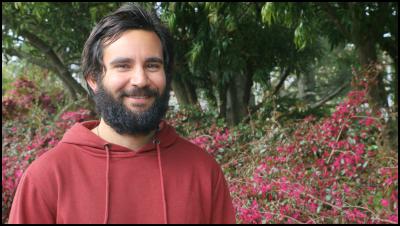Researching the honey buzz
Thursday, 8 September 2016, 2:20 pm
Press Release: University of Waikato
8 September, 2016
Researching the honey buzz

A University of Waikato Master of Science student is researching how to improve the quality of nectar in Mānuka plants, to produce better honey.
Stevie Noe is in the data-collecting phase of his thesis. He spends most days in a greenhouse, collecting and analysing nectar from Mānuka plants.
“Right now I’m measuring how much nectar is produced in the flowers and how that quality changes based on different growing conditions such as temperature, humidity and light,” says Stevie.
Stevie tests the quality of the nectar based on how much dihydroxyacetone (DHA) is present. DHA converts to methylglyoxal (MGO) which is the key ingredient that gives Mānuka honey its reputed health properties. The more DHA there is in the nectar, the more MGO there’ll be in the honey.
After completing a Bachelor of Science, Stevie decided to do his masters on this topic because the Mānuka honey industry is booming.
“Honey is a big deal at the moment. The industry is trying to grow as there’s more demand than there is supply, and the government is backing this growth,” he says.
Stevie recently won the University of Waikato’s Masters Three Minute Thesis (3MT) competition. He was the top presenter out of 10 students who had to summarise their research in just three minutes.
Advertisement - scroll to continue reading
“The competition was a good experience and winning meant I got a $1000 research grant to help fund my studies, which is a big help.”
That’s not the only support Stevie’s received. He’s managed to fund his masters degree with two University of Waikato postgraduate scholarships and Pre-Seed Accelerator Funding (PSAF) from the Ministry of Science and Innovation.
Stevie’s in the final six months of a two-year academic journey. He hopes his research findings will help Mānuka honey producers in New Zealand and around the world.
“Hopefully by the end of it I’ll be able to tell growers how best to test their Mānuka plants to get top results out of their honey,” he says.
If you’re interested in turning your ideas into world-changing research, find out more about postgraduate study at the University of Waikato. Applications are now open for 2017.
ENDS
Advertisement - scroll to continue reading
a.supporter:hover {background:#EC4438!important;} @media screen and (max-width: 480px) { #byline-block div.byline-block {padding-right:16px;}}
Using Scoop for work?
Scoop is free for personal use, but you’ll need a licence for work use. This is part of our Ethical Paywall and how we fund Scoop. Join today with plans starting from less than $3 per week, plus gain access to exclusive Pro features.
Join Pro Individual Find out more
Find more from University of Waikato on InfoPages.